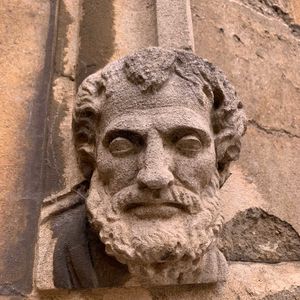After these subjects we must make a fresh start and say that the things having to do with character that are to be avoided are of three forms: vice, lack of self-control, and beastliness. Τhe contraries of two of these are clear, since we call the one virtue and the other self-control. Where the contrary of beastliness is concerned, it would most fit the case to speak of a virtue that is beyond us, one of a heroic or even a divine sort—as when Homer has made Priam say that Hector was exceptionally good: ‘nor did he seem the son of a mortal man, but rather, one of a god.’ So if, as they say, human beings become gods because of an excess of virtue, it is clear that the state opposed to the type that is beast-like will be of this sort. And just as there is in fact neither vice nor virtue of a wild beast, neither is there of a god. But his state is more honorable than virtue, while that of a wild beast is of a different kind than vice. (NE VII.1 1145a15-27)
Μετὰ δὲ ταῦτα λεκτέον, ἄλλην ποιησαμένους ἀρχήν, ὅτι τῶν περὶ τὰ ἤθη φευκτῶν τρία ἐστὶν εἴδη, κακία ἀκρασία θηριότης. τὰ δ᾽ ἐναντία τοῖς μὲν δυσὶ δῆλα· τὸ μὲν γὰρ ἀρετὴν τὸ δ᾽ ἐγκράτειαν καλοῦμεν· πρὸς δὲ τὴν θηριότητα μάλιστ᾽ ἄν ἁρμόττοι λέγειν τὴν ὑπὲρ ἡμᾶς ἀρετήν, ἡρωικήν τινα καὶ θείαν, ὥσπερ Ὅμηρος περὶ <τοῦ> Ἕκτορος πεποίηκε λέγοντα τὸν Πρίανμον ὅτι σφόδρα ἦν ἀγαθός, “οὐδὲ ἐῴκει ἀνδρός γε θνητοῦ πάις ἔμμεναι ἀλλὰ θεοῖο.” ὥστ᾽ εἰ, καθάπερ φασίν, ἐξ ἀνθρώπων γίνονται θεοὶ δι᾽ ἀρετῆς ὑπερβολήν, τοιαύτη τις ἄν είη δῆλον ὅτι ἡ τῇ θηριώδει ἀντιτιθεμένη ἕξις· καὶ γὰρ ὥσπερ οὐδὲ θηρίου ἐστὶ κακία οὐδ᾽ ἀρετή, οὕτως οὐδὲ θεοῦ, ἀλλ᾽ ἣ μὲν τιμιώτερον ἀρετῆς, ἣ δ᾽ ἕτερόν τι γένος κακίας.


 51
51 0
0